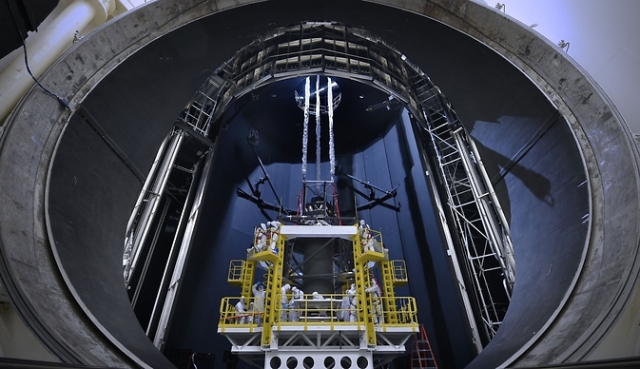Dec 23 2014
"This is what space science is all about," said NASA photographer Chris Gunn, who captured a photo from outside the enormous mouth of NASA's giant thermal vacuum chamber called Chamber A at Johnson Space Center in Houston. Previously used for manned spaceflight missions, this historic chamber is now filled with engineers and technicians preparing for one of NASA's biggest missions, the James Webb Space Telescope.
 Engineers and technicians inside NASA JSC's Chamber A prepare a lift system that will be used to hold JWST during testing. Image Credit: NASA/Chris Gunn
Engineers and technicians inside NASA JSC's Chamber A prepare a lift system that will be used to hold JWST during testing. Image Credit: NASA/Chris Gunn
"There is nothing else like this that anyone will see in their day-to-day lives," said Gunn. Engineers and technicians, dressed in sterile suits and secured by harnesses to stands for safety, are seen inside Chamber A preparing a lift system that will be used to hold the telescope during testing.
Once fully assembled and launched into space, this telescope will allow us to explore ever further into the cosmos, seeing things that even the mighty Hubble Space Telescope can’t. Before this telescope is launched one million miles into space to its destination, it must undergo a series of detailed tests to ensure it's ready for the harsh environment of space. This spring, a model of the telescope called "Pathfinder" will begin cryogenic optical testing inside this chamber.
"Maintaining the schedule with a very large number of optical and ground support equipment integration efforts, while securing the telescope to a suspension system inside the chamber and conducting a cryo-strength test is an incredible integration and test challenge," said Mark Voyton, manager for the Optical Telescope Element and Integrated Science Instrument Module (OTIS).
The James Webb Space Telescope is the scientific successor to NASA's Hubble Space Telescope. It will be the most powerful space telescope ever built. Webb is an international project led by NASA with its partners, the European Space Agency and the Canadian Space Agency.